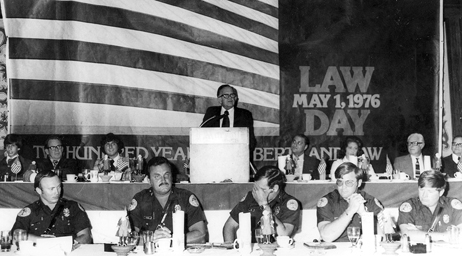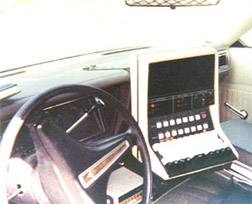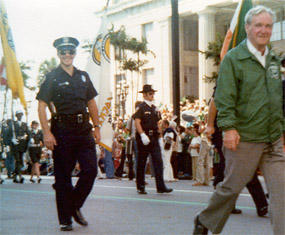
ASSIGNMENTS
 |
MIAMI POLICE DEPARTMENT ASSIGNMENTS |
After I turned 21, I was on the road. One of my first trainers (before the
departments started the F.T.O., Field Training Officer, Program was Bobby
Meyers. I probably would have never lasted as long as my career took me
without the training he gave me. We used to park our patrol car in Overtown in
the area of N.W. 2 Ave. between 6 and 10 Street and walk the sidewalks and into
the bars on Friday and Saturday nights. Bob had a informant tell him
because of all the arrests made in the area, "they" were going to kill Bob with
his own gun. That made me feel real comfortable! While many other
new officers had better areas to ride in, I was down in what they called, "the
Pit". We made many arrests - Bob wanted as many gun carriers off the
street as we could catch. One night, we walked in the middle of a shootout
between the two sides of the street about N.W. 2 Ave. & 6 Street. We
thought one gunman was shooting at us and we didn't know about the one behind
us. As the second gunman came up behind us, he was ready to shoot Bob in
the back of the head when another officer came running across the street towards
us. I yelled the guy with the gun is across the street. The officer kept
coming and started firing. He shot the gunman dead just before he could
shoot Bob. That was a long night. We spent a lot of time with street
people and knew who the second gunman was but we never found him.
|
|
I enjoyed riding by myself but many of the cities
cars were two man cars. We worked three shifts, 7 to 3; 3 to 11 and 11
to 7. The cars almost never shut off. Take home cars were unheard
of. Not to long after I started, new assignments came out for beat assignments in the S.P.U. Unit (Specialized Patrol Unit) where we rode a Harley Davidson Three Wheeler. We moved around, depending on who was off that day. This was back before the Department had three sub stations and then N.E.T. (Neighborhood Enhancement Teams) which made the Department into smaller entities. Back to three wheelers - I rode the areas of Biscayne Blvd. and 79 St.; Downtown and Bayside; Brickell Ave; Little Havana and Coconut Grove. They even had us on the midnight shift for a while. I remember myself and I think it was Frank Arostegui riding up the roof of a parking garage, sitting on the bike, and laying our head on the radio by the windshield with the volume up to wake us up when the dispatcher came on the air. I also had bought a house in Hollywood, Florida and during the night, took clippings of overgrown croton plants in Bayfront Park home. Should I have not said this years later? |
| After riding the three wheeler beat assignments for a few years (if I recall right), I wanted to be part of the "elite" Motor Squad. This was one of the most prestigious assignments on the department and the officers took the motorcycles home. The cons were we rode funeral escorts and special escorts and almost always worked a "double shift". If you were on a 3 to 11 pm shift you stood a good chance of running funeral details from 9 am to 2:59 p.m. The nice thing was the extra money in the pocket. At first I didn't' get selected for motors but during one interview I finally made it. The worst part of the interview was when the Commander of Motors, Lt. Kenneth Harms (later a Chief) asked for my gun and took the bullets out and found one was dirty. I thought it was all over and I would not get selected. I had tried to be almost perfect for that interview and guess what - I was one of several picked. |
|
On the Motor Squad I also worked for about a year or more on the Taxicab Detail where the unit had control over the licensing of taxicabs in the City of Miami. Another part of motors included volunteering to teach traffic school, mostly at night, for people who chose to go to school to avoid points on their license. This is where we gave them tips, showed them gory movies, etc. Below are pictures from a Law Day Luncheon where we were invited. Miami Mayor Stephen Clark was the guest speaker. Some of the pictures I zoomed in

I think the center officer was Jim Gill? (not wanting to be photographed) and Bill Heffernan to his right? |
||
|
|
|
|
 |
To the left is a photo of a M.D.T. (Mobile Digital Terminal). The Miami Police Dept. was one of the first in the nation to have these. They allowed us to run license plates and persons through the Dade County Justice System. Later we were able to connect to the State of Florida F.D.L.E. system for checking persons and then also N.C.I.C. (The National Crime Information Center managed by the F.B.I.). |
| After leaving the motor squad, I realized I needed to study and try to get promoted to Sergeant. It took a couple of tries and a lot of being passed over because I was not a minority. But, in 1985 (?) I was promoted. It really took two days for the ceremony. The ceremony was scheduled and I brought some of my family to the station and then it was cancelled at the last minute. The entire group of us being promoted could not believe it. The next day we received calls it was a go again. I didn't even invite my family because I didn't want to embarrass them again but it was actually a go and we were promoted. |
|
 |
One thing unusual I did was march in the first Irish
Parade held in downtown Miami. There were only a handful of us that did
it. I remember (Major?) Mike Mahoney, another real Irish policeman, Mike McDermott and I think Nancy Olon walked also.
Definitely NOT the person in the picture on the left is
the 2006 Chief Timoney. He became Chief long after I left. |
| During my last two years I was the Commander (as a Sgt.)
of the Computer Support and I.C.A.P. (Integrated Criminal Apprehension
Program) Units. I was involved in a major project to upgrade with
then Lt. Joe Longueira to switch the department from the old mobile
digital terminals to M.D.C. (mobile digital computers). I also learned about second dollar funds and that it was fairly easy to put in for seminars, etc. I was fortunate to travel to a lot of F.D.L.E. Seminars (mostly a razzing sessions between the FSU fans and us outnumbered UM fans. I also went to training/seminars in New Orleans, Washington D.C., Tallahassee, Jacksonville, Tampa and get this, Las Vegas (the hardest one to justify!). I became a F.C.I.C. Certified Instructor and the last year before retiring, I scheduled/taught and certified a large majority of the 1100 sworn members and a smaller number of civilians to be certified by F.C.I.C. with the help of two very important persons, Roberta Young and Ron Hazzard. |
|
| All of a sudden,
the City offered to buy a large group of police employees out and
overnight, I was retiring. I retired exactly 26 years from the day I started (May 12). Most of the others retired May 27 as a group ceremony. I wanted to remember my start and finish day as the same so left earlier. In 1992 I had met Mary Ann Lane and we moved in 1996 to Ormond Beach, Florida. As of 2006, I have been retired a glorious 12 years! Looking back, a lot of people I knew left the department before getting a pension and it was difficult sticking out the rough periods like the riots and the Mariel boatlift. But it paid off in the end and it is nice getting the pension check every month. Now, on the 15th of the month, my major project is starting my emergency generator to make sure it works! My former boss, Dick Witt and his wife Betty and Mary Ann and I helped run the Miami Police Dept. Alumni reunions held in Daytona Beach from 2002 to 2005. This reunion was formerly held in Ocala by Dave and Mercia Lamport. |